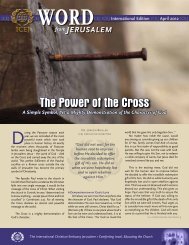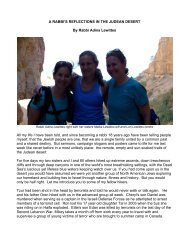WORD JERUSALEM
Mar/Apr 2004 - International Christian Embassy Jerusalem
Mar/Apr 2004 - International Christian Embassy Jerusalem
You also want an ePaper? Increase the reach of your titles
YUMPU automatically turns print PDFs into web optimized ePapers that Google loves.
Inside the Embassy<br />
fund the distribution of Passover baskets to<br />
needy Israeli families this spring.<br />
Peretz explained that three years of terror<br />
attacks and economic recession have<br />
forced the nation to make deep cuts in<br />
welfare spending, and concerned lawmakers<br />
are now looking to Christians to help fill<br />
in the gap.<br />
The Knesset Christian Allies’ Caucus is<br />
the outgrowth of an idea that had been<br />
brewing over recent years among some<br />
Israeli legislators, but through MK<br />
Shtern’s efforts the caucus was rushed<br />
into being after a number of Christian<br />
expatriates residing in Israel ran into difficulties<br />
renewing visas in the second half<br />
of 2003.<br />
Shtern apologised for the visa situation,<br />
citing last autumn’s long civil servants’ strike<br />
and Israel’s restrictive policies in dealing<br />
with security concerns and illegal workers.<br />
The Christian ministries present applauded<br />
the founding of the caucus, noting that<br />
scores of followers abroad had also welcomed<br />
the news of its formation in phone<br />
calls, emails and letters to their offices.<br />
Among the organisations represented at<br />
the caucus launch were the ICEJ, Bridges<br />
for Peace, Christian Friends of Israel, The<br />
Ebenezer Fund, the International Fellowship<br />
of Christians and Jews, the National Unity<br />
Coalition and the Jerusalem Summit.<br />
In an attempt to broaden the effectiveness<br />
of the informal committee, Shtern (of the<br />
right-wing National Union) and Peretz selected<br />
six other Knesset members from an array<br />
of factions to join the caucus, including from<br />
the ruling Likud, Labour, NRP and Shinui.<br />
“We will not be demanding that Christians<br />
adopt any particular political viewpoint on<br />
the conflict here,” said Shtern in clarifying<br />
the goals of the caucus. “We simply are<br />
reaching out to Christians to support Israel<br />
on the basis of our fundamental right to live<br />
here in peace and security.”<br />
The main thrusts of the caucus will be to<br />
raise Israeli awareness of the unconditional<br />
support of Evangelical Christians, launch<br />
joint welfare projects for the needy in the<br />
land, and enlist Christians in efforts to<br />
improve Israel’s standing internationally,<br />
with an urgent need to focus on Europe.<br />
The Knesset members were encouraged<br />
to learn that the formation of their caucus<br />
coincides with the founding of the first registered<br />
pro-Israel lobby at the European<br />
Parliament in Brussels, a Christian initiative<br />
called the “European Coalition for Israel”.<br />
The ICEJ is partnering with the Hollandbased<br />
group Christians for Israel and other<br />
Christian ministries to establish a permanent<br />
presence in Brussels to engage with EP members<br />
on Israel’s behalf. The Coalition will be<br />
formally launched in early March during the<br />
European Commission’s upcoming special<br />
conference on anti-Semitism, organised in<br />
tandem with the European Jewish Congress.<br />
In yet another indication of closer<br />
Jewish-Christian collaboration, the Jewish<br />
officials involved in the anti-Semitism conference<br />
specially invited Christian leaders<br />
from the Coalition to attend and speak at<br />
the landmark event.<br />
In the meantime, Coalition members in<br />
Holland assisted the Israeli emergency<br />
response group Zaka in obtaining official<br />
permission to put on public display in The<br />
Hague an Israeli bus recently blown apart<br />
by a Palestinian suicide bomber in<br />
Jerusalem, killing 11 people. The bus was<br />
shipped there as hard evidence of the<br />
need for Israel’s security fence around<br />
Judea/Samaria, which was the subject of<br />
hearings at the International Court of<br />
Justice beginning February 23.<br />
The decision to send the charred remains<br />
of the bus came when Keren Hayesod, an<br />
arm of the Jewish Agency, summoned some<br />
30 European Christian leaders to Jerusalem<br />
in early February for an emergency summit<br />
on how to fight mounting anti-Semitism in<br />
Europe.<br />
These developments all signal unprecedented<br />
levels of Jewish cooperation with<br />
Evangelical Christians to defend Israel and<br />
the Jewish people. Christians have offered<br />
a hand of friendship for many years and<br />
the mainstream Jewish community is now<br />
reaching out to take that hand as never<br />
before, overcoming deep historic wounds<br />
and suspicions over Christian motives.<br />
In an age when Israel and the West are<br />
confronting the threat of mass terrorism and<br />
Jews are scapegoats once again for all the<br />
world’s ills, Israelis and the Jewish Diaspora<br />
are increasingly realising that Bible-believing<br />
Christians are the best friends they have. ■<br />
- 5 -
















